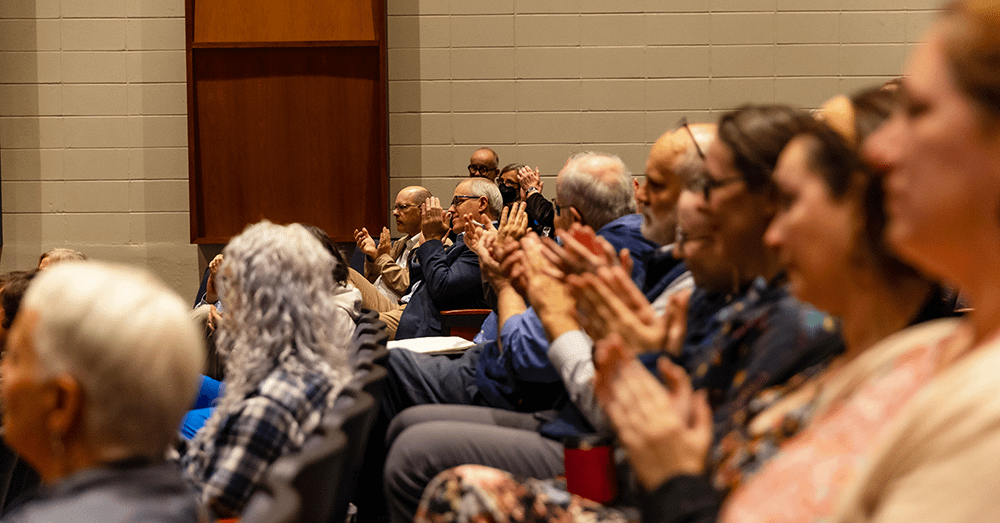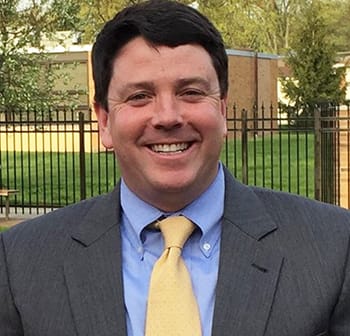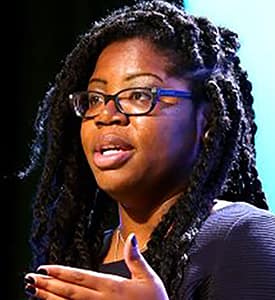Author visit enriches “common text” experience
This year saw a new twist to the “common text” tradition at Saint Michael’s College when for the first time the author of a year’s chosen book visited campus to speak. Pleased with how well students and the author connected, faculty and administrators hope to bring future common-text authors to campus.
Emily St. John Mandel, author of the dystopic fiction novel Station 11, scored a big hit on Thursday, Sept. 3, when hundreds of mostly new students from first-year seminars packed Ross Sports Center alongside some faculty and staff to hear her discuss the work, which is this year’s common text.
“Our students filled a good half-hour of talk with smart questions and insights during a question-answer session,” said Peter Vantine, coordinator of first-year seminars and professor of modern languages/French. “They showed a high level of engagement with the book, asking very specific questions about certain plot elements and character development in the novel, as well as asking her about the process of her work as a writer.”
For two male and two female students chosen otherwise at random among anyone expressing interest, the discussion with Mandel started early at a pre-talk dinner with the author along with faculty and administrators in the Hall of Fame Room, next to the Ross gym, he said.
Widespread reading of common text by all Saint Michael’s first-years and others on campus is a well-established tradition of many years, and as in the past, first-years started reading the year’s choice over the summer before their late-August arrival to campus. Instructors made discussion of Station 11 the first order of business in first-year seminars, which have widely varied themes but all start with the book.
Also, three Saint Michael’s professors applied perspectives from their respective disciplines to the common text in essays, which students read beforehand to inform class discussions. This year’s essayists were Robert Brenneman of sociology, Laura Stroup of environmental science and George Dameron of history.
Vantine described the book’s basic plot and theme: A global pandemic kills 95 percent of the human race; then the narrative jumps ahead 20 years and the reader is following a caravan of actors and musicians traveling around the Midwest, providing for themselves and going to outposts of humans where Shakespeare, classical music and jazz still survive. The story involves an interesting and varied cast of characters flashing back to life before the pandemic, moving from points of view. “Oddly enough, when you get to end of book, it’s strangely uplifting with the idea that the human race can start again and do a better job,” he said.
By the time Mandel visited a few weeks ago, students already had met twice for their seminars and so were well-engaged in discussion of the book, Vantine said. “Reading this wonderful book is your first step into the conversation that is a liberal arts education,” he wrote to students this summer.
Among students attending the dinner with Mandel were Kara Hettinger of Lyndonhurst, IL, Paige Bulson of Vashon, WA, Alexander Otten of Manassas, VA, and Sean Broderick of Boston MA. President Jack Neuhauser, Vice President for Academic Affairs Karen Talentino, Vantine and the three faculty essayists, also were present, as were Selection Committee members who chose the book last spring: Elizabeth Inness-Brown (English) Mike Battig (computer science) and Robert Lair (religious studies).
Mandel is a busy woman, the diners learned: she told them this was her 85th book event his year, with 20 to go. She graciously signed books for people after the dinner, where conversation ranged from her life as an author to some of the great TV shows that the author enjoys such as The Wire or Breaking Bad, which are capturing national attention in the way that great literature does, Vantine said.
The talk itself included Mandel’s prepared remarks for about 45 minutes, during which she touched on the writing process, research, a little history of pandemics and disease, and our human emotions surrounding those things. She said we live in a time with many apocalyptic stories in literature and TV, but t people always seem to think they are living in the end days. “Most of her answers to students either explained a very specific reason for some choice of plot element or character, or told how it might be inspired by something from her life — or a few times she surprised students by saying that something had no deeper symbolism intended despite how it might have seemed,” Vantine said.
Inness-Brown, the English professor and successful fiction author who first proposed inviting the author to campus as part of the selection committee and as the first-year seminar coordinator last year, described scenes that assured her the talk had been a success: “When we walked in with her it was like a rock star was being greeted with shouting and applauding. They were really excited to see her,” Inness-Brown said. “Two girls came up afterwards to get selfies taken with her!”
One of Inness-Brown’s students, Lesley Neves ’19 of Reno, NV, had many good questions and insights for the author following the talk, and joked in preface to one query that she was a “serial question-asker,” said Inness-Brown.
All students at Saint Michael’s enroll in a First-year Seminar during their first or second semester. These writing-intensive seminars explore broad questions, and classes are small to encourage discussions and active learning while instructors and students come to know each other well. Seminar titles this year are “The Examined Life,” “Tries: Creative Writing,” “A River Runs Through It,” “Show, The Art and Science of Alpine Crystals,” “Theatre and Social Justice,” “On Memory,” “Globalization, “Place and Placelessness,” “Peace and Justice,” and “Technology and Ethics in Society.” Some of those will be offered again in the spring.





